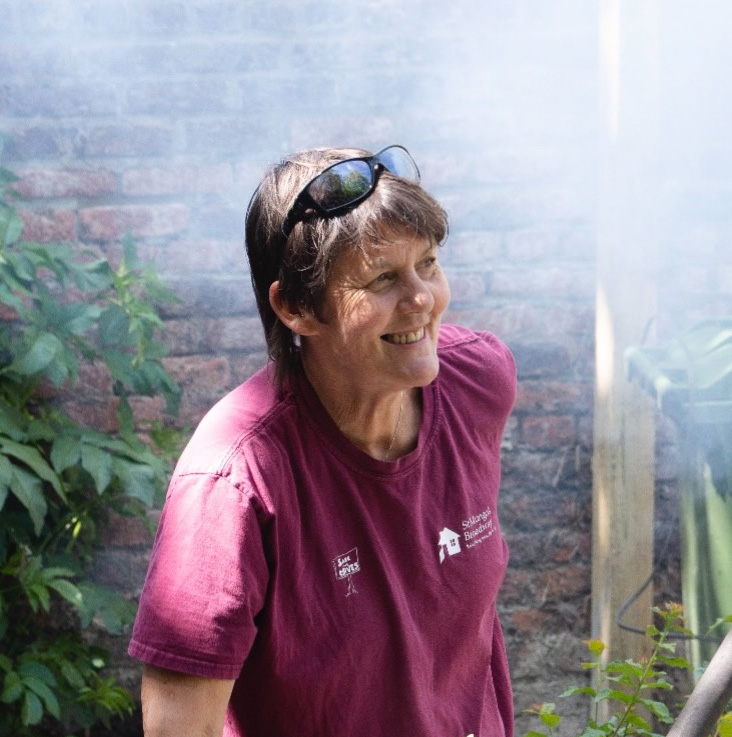Clients spend two years in the Putting Down Roots program, tending the garden a few days a week – and the results are astonishing, says Gardener Trainer Rubyjo Narbey.

I feel I’ve got the best job at St Mungo’s. I’ve been a Gardener Trainer for the past 9 years, during which I’ve supported 180 clients.
That may not seem like a lot, but it’s one of the longest recovery programs: they stay for two years, learning how to garden two or three days a week. Once they finish, they don’t want to go!
Putting Down Roots is about bringing people together, bringing them out of their home situations whether they’re in hostels, their own flats, or in recovery in dry houses, they can come and just be themselves.
It’s a very non-judgmental group. Really great friendships have formed; there’s so much peer support.
The first thing we do is ask what they like to eat; we’re not going to grow brussels sprouts if they don’t like them. They choose, sow the seeds, grow them and eat them.
Cucumbers and tomatoes are popular choices, spinach, chard – sweetcorn is always really popular. When we get a good crop we pick it, boil it and eat it right there. Everyone goes wild for it.
“Putting Down Roots is about bringing people together.”
Rubyjo
I absolutely love seeing how people change. When people first come they’re shy and anxious. Often they haven’t laughed for a long time, haven’t been able to let go and be themselves; but nobody has to be anything but themselves here. Sometimes it takes a while to learn that. We see how their confidence grows, the anxiety lessens, and we have fun.
A lot of them have worked, they may have been bricklayers or accountants, and for whatever reason they’ve become homeless, so it’s about bringing people’s different skill sets out from their pasts.
People’s mental health improves from being outside and having structure back in their lives, and people in recovery can sustain their abstinence better. If they do relapse, we phone them and say, “Come on back, you’re not going to be judged”.
I think the biggest thing is they feel part of a community again.
On the streets you’re ostracised and ignored. But here they’re creating something from seemingly nothing and they’re so proud of it – and they’ve got every right to be.
The fact that it lasts two years is important because you get two years of growing seasons, you see the cycle of life and the bulbs coming through, and every week you come back and see what’s changed. And when a plant fails, that’s life.
We had one client referred to us from our men’s crisis house; he had a professional background and something happened in his family that led to a complete breakdown. When he arrived he was like a mouse, he would hardly speak. He came back every couple of days and then started being a bit more open, talking, taking an interest in other people.
After about 18 months we asked if he’d like to be a volunteer. He was brilliant, so empathetic and took on all the new clients and taught them what he’d learned. He now works full-time as a support manager at a mental health service here in Bristol.
One client was living in a tent when he started with us. He’d be early for every session and take stuff back to his tent to cook.
They come away with a certificate in horticulture. Some have gone onto gardening jobs, or their own allotments. But mostly, the change we see in people’s confidence is what makes this such an invaluable program. People are like little closed buds when they turn up, and leave fully blossomed.
Wilkins, 62, takes part in the London Putting Down Roots programme and says, “The joy of planting tomatoes and witnessing their growth, knowing I’ll eventually harvest them, instils a profound sense of achievement in me. Engaging in such meaningful activities alongside others fosters a sense of camaraderie and support, turning what could be solitary moments into cherished opportunities for connection and encouragement from the facilitators and colleagues.”
“Engaging in such meaningful activities alongside others fosters a sense of camaraderie and support, turning what could be solitary moments into cherished opportunities for connection.”
Wilkins
3 Thomas More Square, Tower Hill, London E1W 1YW | 020 3856 6000 | info@mungos.org
© 2024 St Mungo’s Registered Charity No 1149085, Company No 8225808, Housing Association No LH0279, VAT Registration No. 155 134 821
Website by St Mungo’s. Maintained by Core Bid Management.
Appeals Policy
Case Closure and Reopen Guidance
Clearing House FAQs November 2022
Clearing House Nomination Policy & Procedure v1.1
Clearing House Sensitive Lets Policy & Procedure v1.1
Clearing House User Agreement v4
Complaints Policy
Couples Referral Guidance
Data Protection and Information Sharing Policy
Eligibility Policy
High Needs Quota Policy & Procedure
Hostel Decant Policy & Procedure
Nomination Guidance
Nominations Appendix A – Allocations and Prioritisation
NSNO Low Needs Staging Post Offer Policy & Procedure
Policy Addendum Clarification 2019
Referral and Waiting List Policy & Procedure
Referral Coaching Policy & Procedure – Volunteers v1.0
Referral Form Minimum Standards v1.2
Resettlement Policy & Procedure
Tenancy Review Policy & Procedure
Transfers Policy & Procedure